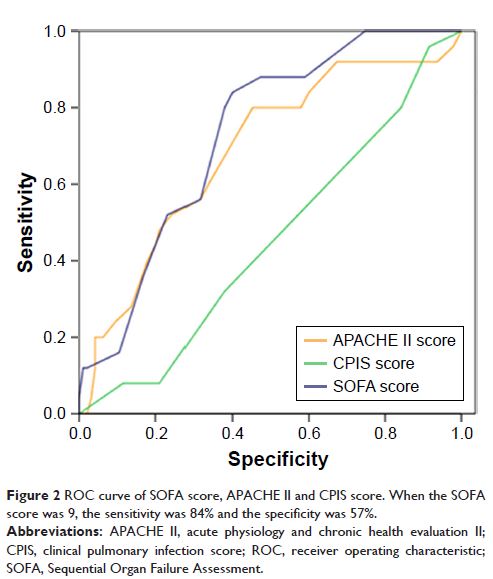108985
论文已发表
注册即可获取德孚的最新动态
IF 收录期刊
- 3.4 Breast Cancer (Dove Med Press)
- 3.2 Clin Epidemiol
- 2.6 Cancer Manag Res
- 2.9 Infect Drug Resist
- 3.7 Clin Interv Aging
- 5.1 Drug Des Dev Ther
- 3.1 Int J Chronic Obstr
- 6.6 Int J Nanomed
- 2.6 Int J Women's Health
- 2.9 Neuropsych Dis Treat
- 2.8 OncoTargets Ther
- 2.0 Patient Prefer Adher
- 2.2 Ther Clin Risk Manag
- 2.5 J Pain Res
- 3.0 Diabet Metab Synd Ob
- 3.2 Psychol Res Behav Ma
- 3.4 Nat Sci Sleep
- 1.8 Pharmgenomics Pers Med
- 2.0 Risk Manag Healthc Policy
- 4.1 J Inflamm Res
- 2.0 Int J Gen Med
- 3.4 J Hepatocell Carcinoma
- 3.0 J Asthma Allergy
- 2.2 Clin Cosmet Investig Dermatol
- 2.4 J Multidiscip Healthc

已发表论文
在 SOFA 评分指导下,哌拉西林/他唑巴坦输注模式治疗患有医院获得性肺炎的癌症患者:一项随机对照研究
Authors Lyu Y, Yang Y, Li X, Peng M, He X, Zhang P, Dong S, Wang W, Wang D
Received 6 July 2017
Accepted for publication 14 November 2017
Published 21 December 2017 Volume 2018:14 Pages 31—37
DOI https://doi.org/10.2147/TCRM.S145681
Checked for plagiarism Yes
Review by Single-blind
Peer reviewers approved by Dr Amy Norman
Peer reviewer comments 2
Editor who approved publication: Professor Deyun Wang
Background: This study aimed to
select piperacillin/tazobactam (TZP) infusion mode guided by Sequential Organ
Failure Assessment (SOFA) score in cancer patients with hospital-acquired
pneumonia (HAP) postoperation.
Patients and methods: A total of 120 cancer patients with postoperative HAP were divided into two groups: improved administration group (L group) and conventional treatment group (Con group). The Con group received traditional infusion of TZP and the L group received it as prolonged infusion. Blood drug concentration was detected at different time points. Based on the SOFA cut-off value of 9, the patients were regrouped into M (mild) and S (severe) groups.
Results: Percent time that the free drug concentrations remain above the minimum inhibitory concentration (%fT>MIC) was longer than 5 h in L group, but <4 h in Con group. Administration method (p =0.033, OX value 2.796, B value 1.028, 95% CI: 0.855–8.934) and SOFA score (p =0.038, OX value 0.080, B value -2.522, 95% CI: 0.007–0.874) were independent predictors of patient survival. In the S group, compared to conventional treatment, prolonged infusion mode resulted in shorter days of antibiotic use and shorter ventilator time, and achieved longer survival, better clinical efficacy, and lower 28-day mortality rate.
Conclusion: For cancer patients with SOFA score ≥9, prolonged infusion of TZP could benefit the patients and obtain better clinical efficacy.
Keywords: cancer, Sequential Organ Failure Assessment score, piperacillin, tazobactam, pneumonia, antibiotics
Patients and methods: A total of 120 cancer patients with postoperative HAP were divided into two groups: improved administration group (L group) and conventional treatment group (Con group). The Con group received traditional infusion of TZP and the L group received it as prolonged infusion. Blood drug concentration was detected at different time points. Based on the SOFA cut-off value of 9, the patients were regrouped into M (mild) and S (severe) groups.
Results: Percent time that the free drug concentrations remain above the minimum inhibitory concentration (%fT>MIC) was longer than 5 h in L group, but <4 h in Con group. Administration method (p =0.033, OX value 2.796, B value 1.028, 95% CI: 0.855–8.934) and SOFA score (p =0.038, OX value 0.080, B value -2.522, 95% CI: 0.007–0.874) were independent predictors of patient survival. In the S group, compared to conventional treatment, prolonged infusion mode resulted in shorter days of antibiotic use and shorter ventilator time, and achieved longer survival, better clinical efficacy, and lower 28-day mortality rate.
Conclusion: For cancer patients with SOFA score ≥9, prolonged infusion of TZP could benefit the patients and obtain better clinical efficacy.
Keywords: cancer, Sequential Organ Failure Assessment score, piperacillin, tazobactam, pneumonia, antibiotics
